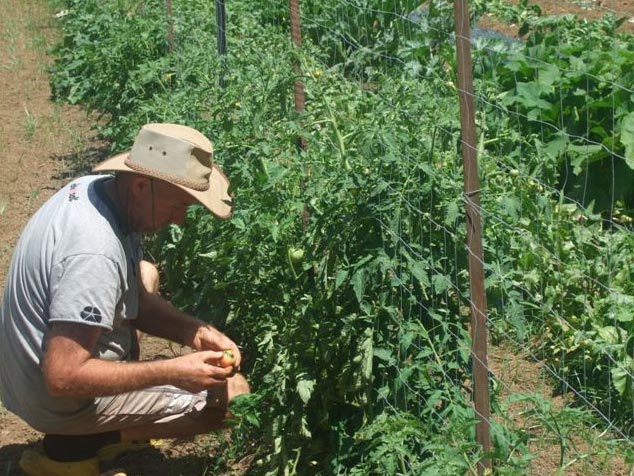New Govardhana Farm Supplies Deities With Own Vegetables
By Madhava Smullen | Дек 06, 2008

Despite difficulties earlier this year, ISKCON’s certified organic farm in Australia, New Govardhana, is now able to supply its Radha Krishna deities with all the vegetables needed for their offerings.
A flood hit the 900 acre property just outside Murwillumbah, New South Wales earlier this year, submerging crops and covering them in river silt. Weeds overgrew and choked the crops; while bad soil conditions invited various root diseases. The farm’s watermelons, tomatoes, eggplant, capsicum, basil, beans and a few others were lost; however, devotees managed to save corn, okra and pumpkins.
New Govardhana has since recovered, shifting the agriculture out of the flood zone and testing various methods for weed control. Today they have 3 acres of fruit trees and 2 acres of vegetables including: potatoes, black and white eggplants, two types of beans, four types of lettuce, tomatoes, spinach, zuchinnis, chillies, beetroot, squash, okra, and peas. These supply the deities as well as producing some surplus.
Head gardener Trevor Gore, who began his career working in his father’s market garden in the 1970s, spends 4 to 5 hours a day on the New Govardhana farm. “This type of work goes in phases,” he says. “First there is tilling, then planting, then various maintenance tasks such as weeding and staking (for tomatoes). Right now, the main task is picking. There is a constant need to check the fences so the peacocks don’t devastate the plants.”
Trevor is often assisted by WWOOFers (Willing Workers on Organic Farms). The WWOOF program, through which travelers work in exchange for food and accommodation, enables them to see the country cheaply and learn about organic farming.
In the future, Trevor says, the farm should be able to provide both the deities and residents of New Govardhana with all of the vegetables, milk and fruit they need. He doesn’t see complete self-sufficiency happening any time in the near future, however. “Grains are the problem,” he explains. “I just don’t see too many devotees enthusiastic to laboriously plant, weed, cut and mill an acre of wheat when they can just go buy a bag of flour.”
Still, he believes there is hope if enough devotees are willing to commit. “Especially if some of the young chaps with a propensity towards farming were encouraged to take this up as a full time service,” he adds. “Right now the main people who are involved in the agriculture here are over 50 years of age.”















